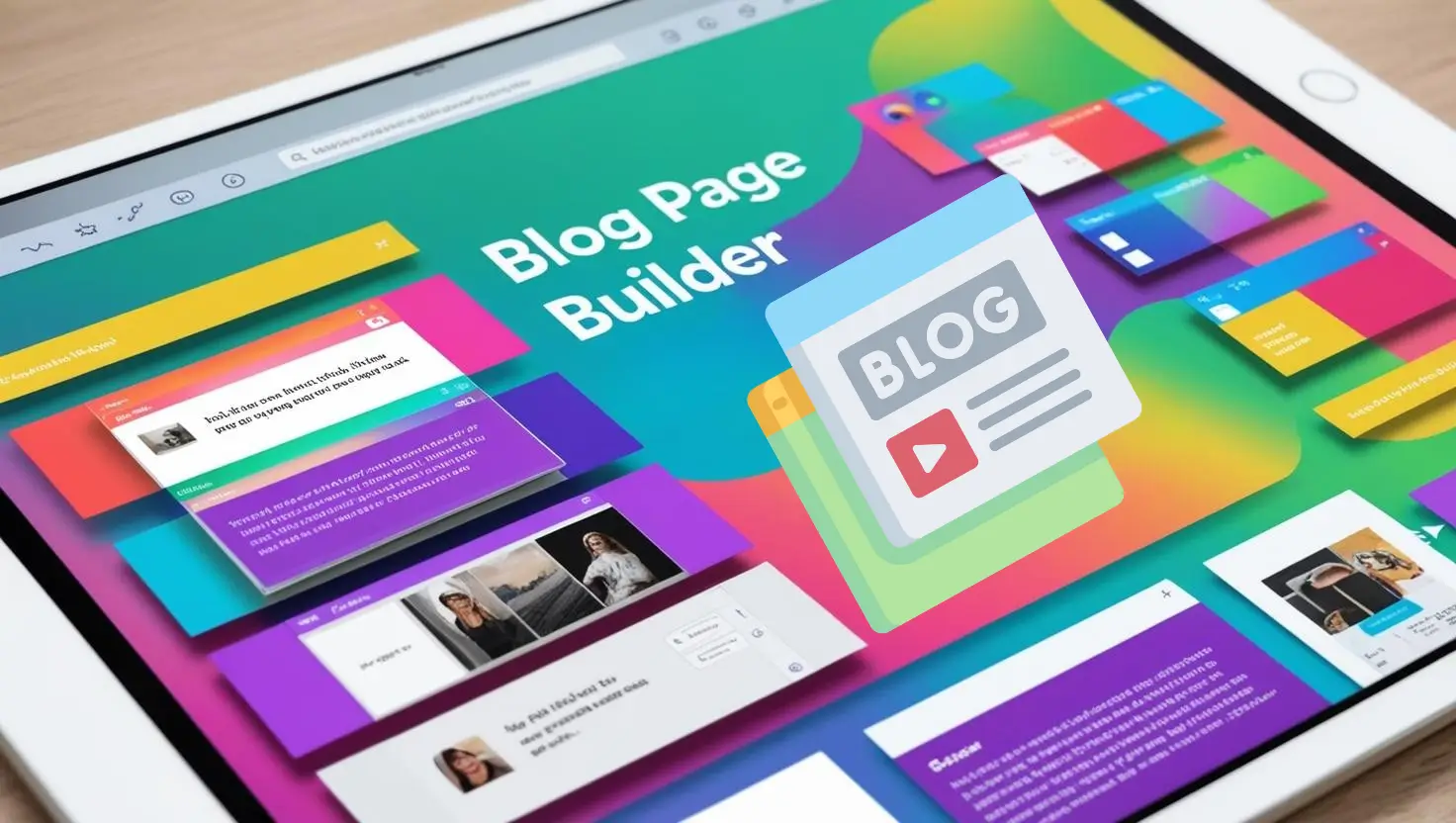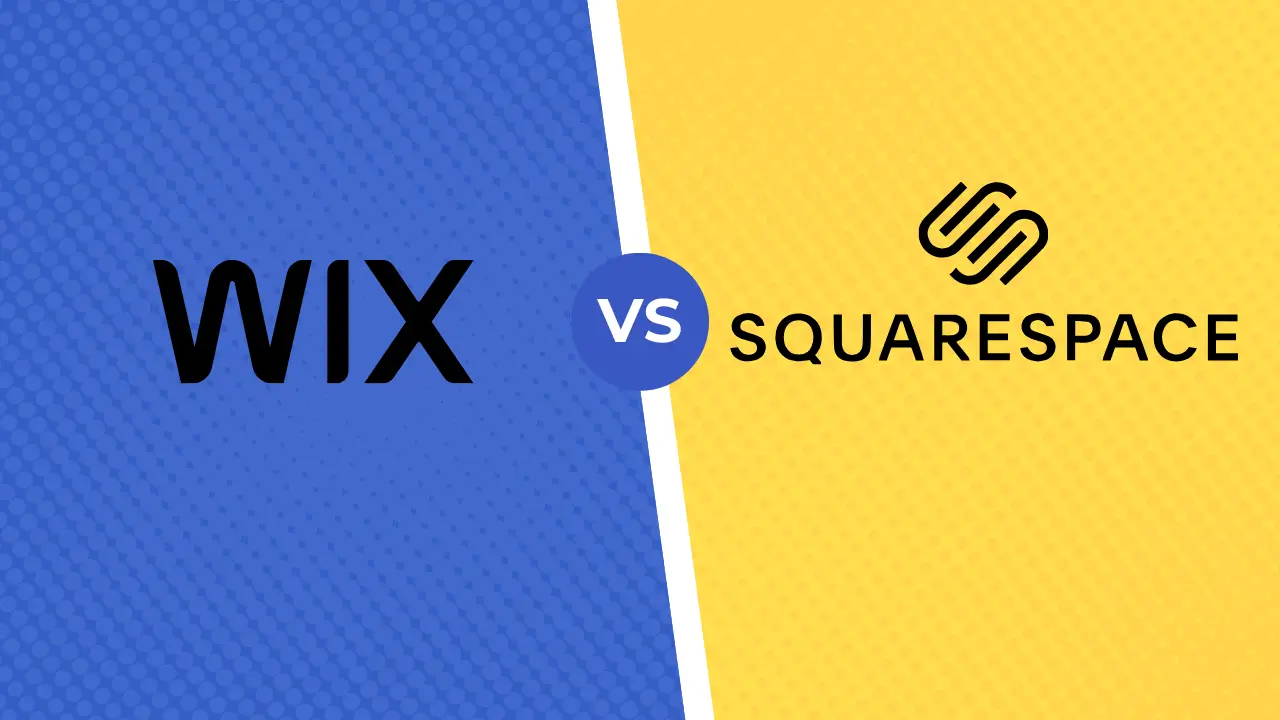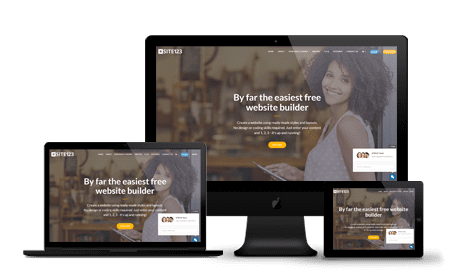Best Website Builders for 2025
Last updated: September 2025
You don’t need a developer, a design degree, or a big budget to build a professional-looking website in 2025. With today’s website builders, anyone from small business owners to first-time side hustlers can launch a beautiful, functional site in just a few clicks.
- Choose from 800+ designer made templates
- 1000+ innovative small business features
- Enterprise level security
- Used by millions of businesses across the globe
- Fully customizable, user-friendly interface
- Seamless integrations to boost your business
- 100+ Professional templates
- 30-day money-back guarantee
- Lightning-fast website load time
- All-in-one platform to power your website
- Easy-to-customize website templates
- Feature-rich website builder
- Easy drag & drop WordPress builder
- Get started with over 300 templates
- 24/7 builder support
- Over 3M already chose web.com
- Award-winning software
- Free 1-hour design support session*
- AI-powered & custom websites
- Industry-leading SEO tools
- Enterprise-grade security & stability
- 1 month money back trial
- Free domain for first year
- Customer support available 24/7
- Top rated drag & drop editor
- Live editing capabilities
- Powers 5,000,000+ websites
- 100+ design templates
- Drag & drop product merchandising
- Industry-leading expertise
- 24/7 live chat support
- Sell globally with an online store
- Free email accounts with different plans
- Used by 123,000 small business owners
- No coding or design experience required
- Create a website within 10 min
The rise of website-building services has changed the game. No more emailing developers for minor tweaks or waiting weeks for updates. The best website builder platforms now offer drag-and-drop simplicity, mobile-friendly templates, and built-in tools for blogging, e-commerce, SEO, and more. It’s everything you need to get an online presence, fast.
And the cost savings? Huge. Using the best easy website builder means skipping hefty design fees and paying a predictable monthly rate instead. Some platforms even offer a free website builder plan to help you get started risk-free.
Whether you’re looking for the best website builder for your small business, a professional website builder for your growing brand, or want the best website maker to showcase a portfolio, this guide covers the top website builders of the year. We’ve reviewed each for ease of use, features, value, and scalability, so you can confidently choose the best web builder for your next move.
Ready to build a website without the hassle? Let’s break down the top picks.
Best Website Builders in 2025
⭐ Wix – Best for creative freedom and beginners
⭐ Shopify – Best for ecommerce and dropshipping
⭐ Hostinger – Best for affordable all-in-one site building
⭐ Squarespace – Best for stunning design and branding
⭐ Bluehost – Best for building WordPress sites with ease
⭐ Web.com – Best for quick setup with ready-made templates
⭐ Duda – Best for freelancers and agency client work
⭐ IONOS – Best for budget-friendly business websites
⭐ Elementor – Best for WordPress users who want design control
⭐ BigCommerce – Best for growing and large online stores
⭐ SITE123 – Best for simple one-page or small sites
⭐ Webador – Best for personal sites and first-time users
Quick Comparison
| Website Builder | Best For | Standout Feature | Price Range | AI Tools Included? |
| Wix | Creative freedom & beginners | Highly customizable drag-and-drop editor | Mid-range | ✅ |
| Shopify | E-commerce and dropshipping | Product management & inventory | Mid-range | ✅ |
| Hostinger | All-in-one hosting | Built in hosting + AI site builder | Low-cost | ✅ |
| Squarespace | Design-focused small businesses | Award-winning templates and design tools | Mid-range | ❌ |
| Bluehost | WordPress beginners | Easy WordPress integration | Low-cost | ❌ |
| Web.com | Quick setup with templates | Straightforward setup process | Mid-range | ❌ |
| Duda | Agencies and freelancers | Client management tools | Mid-range | ✅ |
| IONOS | Budget-conscious beginners | Very low starting price | Low-cost | ✅ |
| Elementor | WordPress power users | Advanced site design within WordPress | Freemium | ❌ |
| BigCommerce | Large-scale e-commerce | Scalable e-commerce features | Enterprise | ✅ |
| SITE123 | Simple one-page sites | Super fast setup wizard | Free | ❌ |
| Webador | Personal websites | Beginner-friendly interface | Free | ❌ |
Our Top Picks
We tested and compared the top website builders for ease of use, features, pricing, and who they’re best suited for. Here’s a quick look at our favorite platforms for 2025 and what makes each one stand out.
Wix: Best for beginners
 Choose from 800+ designer made templates
Choose from 800+ designer made templates  1000+ innovative small business features
1000+ innovative small business features Wix is one of the most popular website builders in the world—and for good reason. It gives you total control over your site’s layout without needing to code. With hundreds of designer-made templates, built-in marketing tools, and an intuitive drag-and-drop editor, it’s the best website builder for users who want creative freedom without the technical headache.
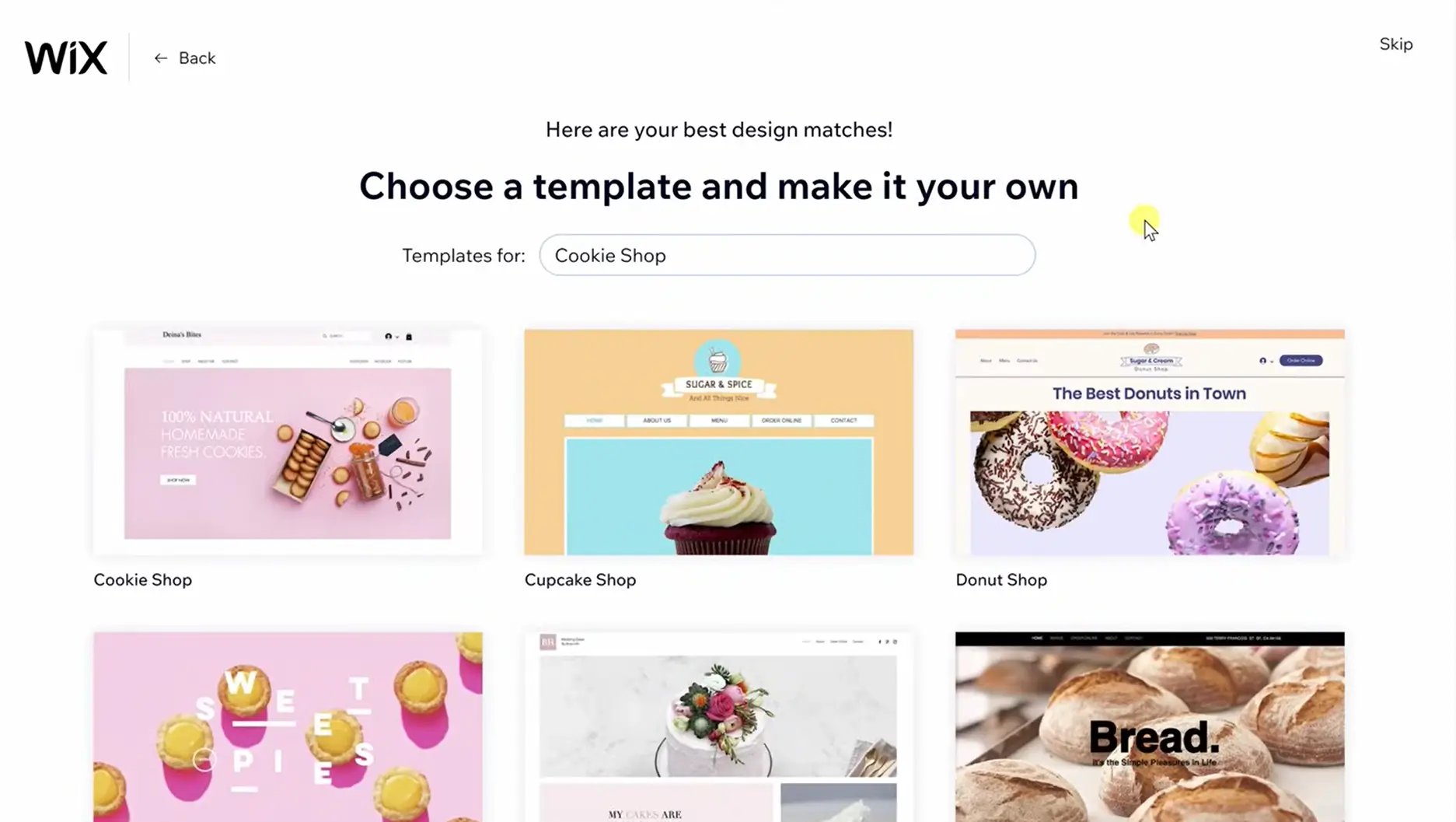
Key Features
- Drag-and-drop editor: Customize every part of your site visually, no coding needed
- 800+ templates: Professionally designed layouts for businesses, portfolios, stores, and more
- App Market: Extend your site with apps for booking, chat, forms, and beyond
- AI Site Generator: Build a full site in minutes by answering a few questions
- Mobile optimization: Every site is automatically mobile-friendly
- Built-in SEO tools: Easily optimize your pages to help rank on search engines
Pros and Cons
Pros
- Extremely beginner-friendly
- Total design flexibility
- Massive library of templates and apps
- AI-powered site creation
- Strong ecommerce and blog features
Cons
- Can feel overwhelming due to so many options
- Less structured than some builders (easy to over-customize)
- Premium plans can add up
Who It’s For
Wix is ideal for entrepreneurs, small business owners, creatives, and anyone who wants to build a website that looks exactly how they envision it, without hiring a developer. It’s one of the best easy website builders in today’s market, especially if you want freedom to play and personalize.
Shopify: Best for e-commerce and dropshipping
 Used by millions of businesses across the globe
Used by millions of businesses across the globe  Fully customizable, user-friendly interface
Fully customizable, user-friendly interface Shopify is a dedicated ecommerce platform built to help users launch, manage, and scale online stores. Unlike general-purpose website builders, Shopify is focused on selling physical products: digital goods, or dropshipping. With powerful inventory tools, built-in payments, and hundreds of integrations, it’s a go-to choice for serious online retailers.
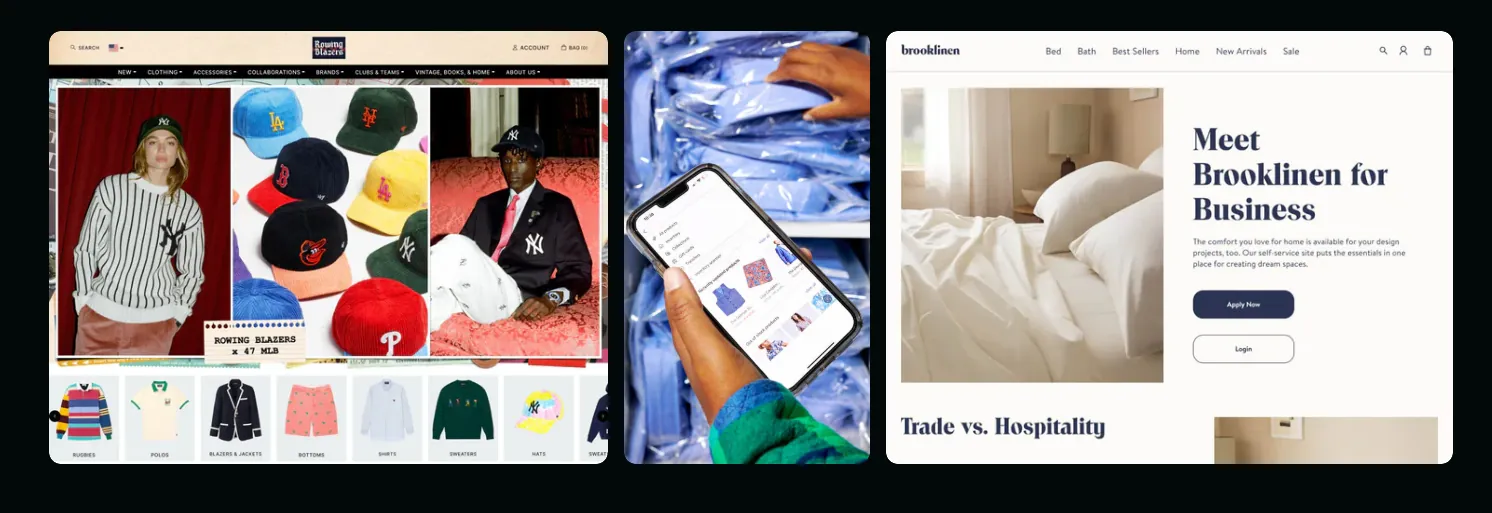
Key Features
- Product & inventory management – Track stock, variations, SKUs, and fulfillment
- Built-in checkout & payments – Accept credit cards, Apple Pay, Google Pay, and more
- Abandoned cart recovery – Automatically follow up with shoppers who don’t complete purchases
- Sales channels – Sell on Facebook, Instagram, Amazon, TikTok, and in-person with Shopify POS
- App store – Extend functionality with thousands of plugins
- Themes & customization – Mobile-optimized, responsive storefront templates
Pros and Cons
Pros
- Built specifically for e-commerce
- Scales easily for growing stores
- Strong support for omnichannel selling
- Secure and fast checkout
- Excellent third-party app ecosystem
Cons
- Less flexible for non-ecommerce sites
- Costs add up with paid apps and transaction fees
- Design customization can be limited without code
Who It’s For
Shopify is best suited for users focused on selling online, whether launching a small boutique or running a high-volume dropshipping business. It’s one of the top website builders for ecommerce thanks to its stability, feature depth, and ease of use for merchants.
Hostinger: Best for affordable all-in-one site building
 100+ Professional templates
100+ Professional templates  30-day money-back guarantee
30-day money-back guarantee Hostinger combines web hosting and site building into a single, beginner-friendly platform. Its website builder (formerly Zyro) is designed for speed and simplicity, offering AI-powered tools, drag-and-drop design, and built-in ecommerce features. It’s a cost-effective solution for anyone who wants to build a website quickly—without managing separate hosting or software.
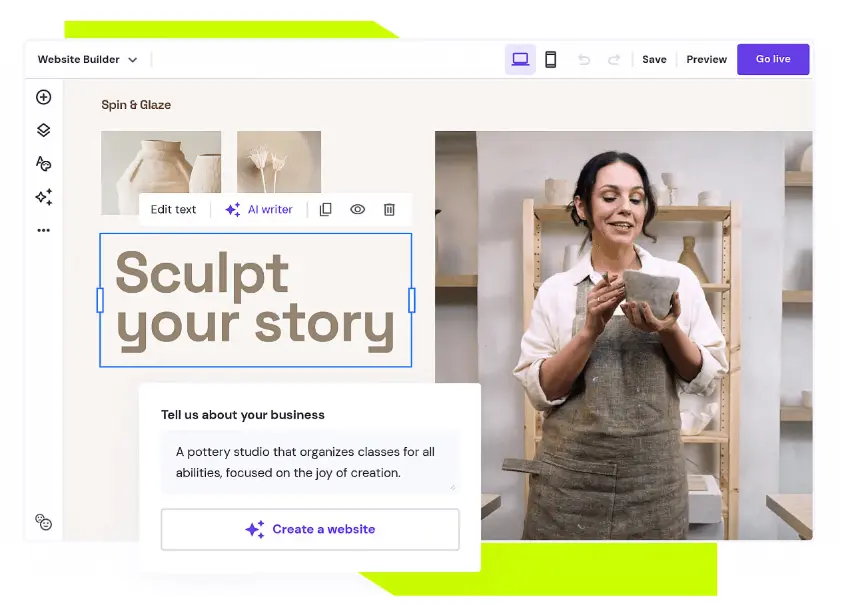
Key Features
- AI website builder – Generate layouts, copy, and images with built-in AI tools
- Integrated hosting – No need to purchase separate hosting; everything is included
- Pre-designed templates – Clean, responsive themes for business, portfolio, and online stores
- Ecommerce support – Sell products online with inventory, shipping, and payment tools
- SEO & analytics tools – Basic SEO features and Google Analytics integration
- Free domain with paid plan – One less thing to worry about when getting started
Pros and Cons
Pros
- Very affordable pricing
- Fast setup with AI-powered tools
- Includes hosting and domain in one package
- Lightweight and user-friendly interface
Cons
- Fewer design and customization options than others
- Smaller app and template library
- Limited scalability for complex websites
Who It’s For
Hostinger is ideal for individuals and small businesses looking for an easy, low-cost way to get online. If you’re after the best web builder that includes hosting and automation in one bundle, it’s a strong pick, especially for budget-conscious users.
Squarespace: Best for stunning design and branding
 All-in-one platform to power your website
All-in-one platform to power your website  Easy-to-customize website templates
Easy-to-customize website templates Squarespace is known for its visually polished templates and all-in-one platform tailored to creatives, entrepreneurs, and small businesses. It’s a professional website builder that focuses heavily on design quality, offering tools for content creation, online selling, and brand building. Everything—from blogging to ecommerce—is managed within a single, sleek dashboard.

Key Features
- Award-winning templates – Modern, responsive themes optimized for images and typography
- Built-in ecommerce – Sell physical and digital products with inventory and tax tools
- Marketing tools – Email campaigns, SEO features, and social media integrations
- Blog and portfolio support – Great for showcasing creative work or thought leadership
- Logo maker & branding tools – Build your brand visuals directly in the platform
- Analytics dashboard – Track visitor behavior and site performance
Pros and Cons
Pros
- Visually impressive templates
- All-in-one platform (no separate hosting required)
- Excellent support for content-heavy sites
- Strong built-in marketing and SEO tools
- Reliable uptime and site speed
Cons
- Less flexible for highly customized layouts
- Fewer third-party app integrations compared to others
- Editor can feel restrictive for advanced users
Who It’s For
Squarespace is a strong choice for small business owners, freelancers, and creatives who prioritize branding and visual design. If you’re looking for the best website maker to showcase your work or business with style, it’s one of the top website builders to consider.
Bluehost: Best for building WordPress sites
 Easy drag & drop WordPress builder
Easy drag & drop WordPress builder  Get started with over 300 templates
Get started with over 300 templates Bluehost is a hosting provider that offers an integrated website builder with full WordPress compatibility. It’s a great option for users who want the flexibility and power of WordPress but with a simpler, more guided setup. With built-in templates, ecommerce support, and automatic updates, it’s a practical pick for small business owners looking for the best website builder for small business.
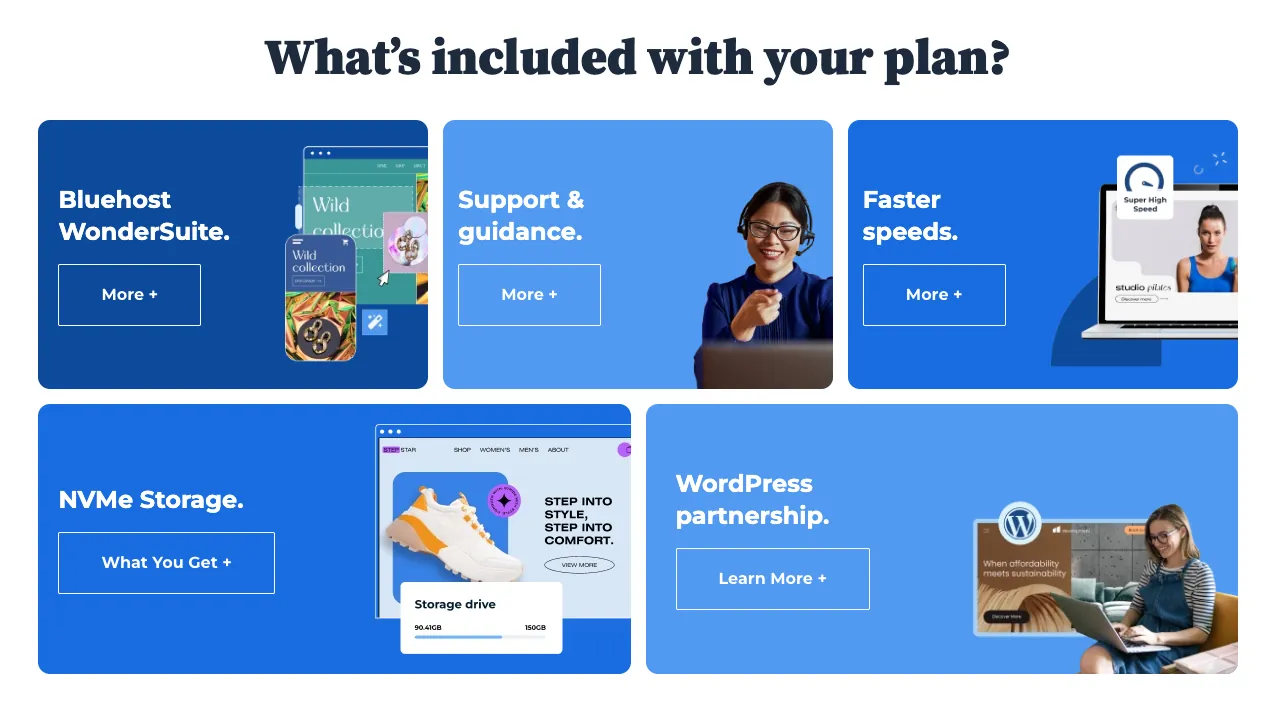
Key Features
- WordPress integration – Pre-installed and optimized for performance
- Drag-and-drop builder – Visual editor layered on top of WordPress
- Ecommerce support – WooCommerce-ready with payment and inventory tools
- Included hosting & domain – One-stop solution for launching a site
- Custom templates – Designed specifically for WordPress users
- Marketing tools – SEO, email marketing, and analytics built-in
Pros and Cons
Pros
- Combines WordPress power with user-friendly tools
- Hosting, domain, and builder in one package
- Strong performance and uptime
- WooCommerce support for online stores
- Helpful onboarding for beginners
Cons
- Less intuitive than non-WordPress builders
- Design options more limited than Wix or Squarespace
- Site management can feel more technical over time
Who It’s For
Bluehost is best for users who want the flexibility of WordPress without having to configure everything manually. If you’re aiming to build a website that can grow with your business and want hosting included, Bluehost is a solid, affordable choice among website building services.
Web.com: Best for quick setup with ready-made templates
 Over 3M already chose web.com
Over 3M already chose web.com  Award-winning software
Award-winning software Web.com offers a straightforward website builder aimed at users who want to get online quickly without a steep learning curve. Its main strength lies in its pre-designed templates, fast setup process, and bundled hosting. While it doesn’t have the bells and whistles of some competitors, it covers the basics well—making it one of the best easy website builders for small business owners who want speed over complexity.
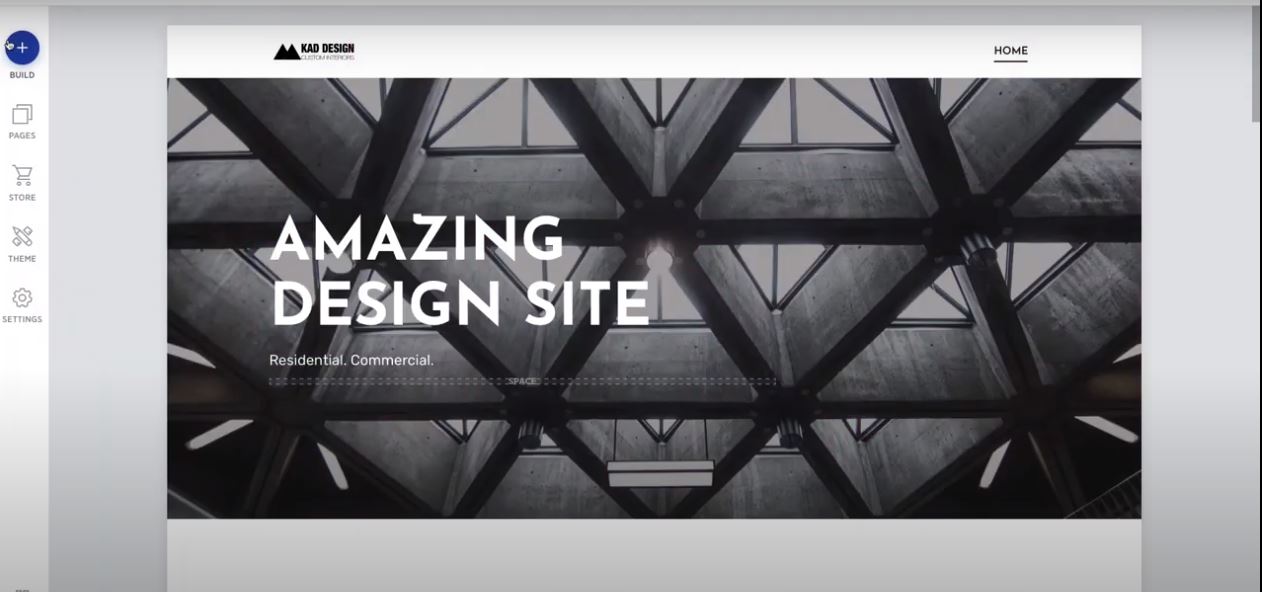
Key Features
- Prebuilt templates – Choose from professionally designed layouts for various industries
- Drag-and-drop builder – Simple editor for placing and customizing elements
- Domain & hosting included – Everything you need to launch is in one package
- Business-focused tools – Includes contact forms, maps, and scheduling widgets
- Basic ecommerce – Ability to sell products, manage orders, and accept payments
- Marketing support – Optional services like SEO help and logo design
Pros and Cons
Pros
- Very fast setup process
- Good selection of starter templates
- Hosting and domain included
- Suitable for service-based businesses
- Live support available
Cons
- Less flexible customization
- Smaller feature set compared to other builders
- Limited third-party integrations
- Not ideal for scaling or complex sites
Who It’s For
Web.com is best for small business owners or first-time users who want a simple site up and running fast, without worrying about too many design or technical decisions. It’s a practical choice among professional website builders for service-based businesses or local shops.
Duda: Best for freelancers and agency client work
 AI-powered & custom websites
AI-powered & custom websites  Industry-leading SEO tools
Industry-leading SEO tools Duda is a professional-grade website builder designed with agencies, freelancers, and web professionals in mind. It offers tools for client management, team collaboration, and multi-site management—along with a sleek drag-and-drop editor. While it’s more niche than some of the top website builders, it shines when used for building and maintaining multiple client sites efficiently.
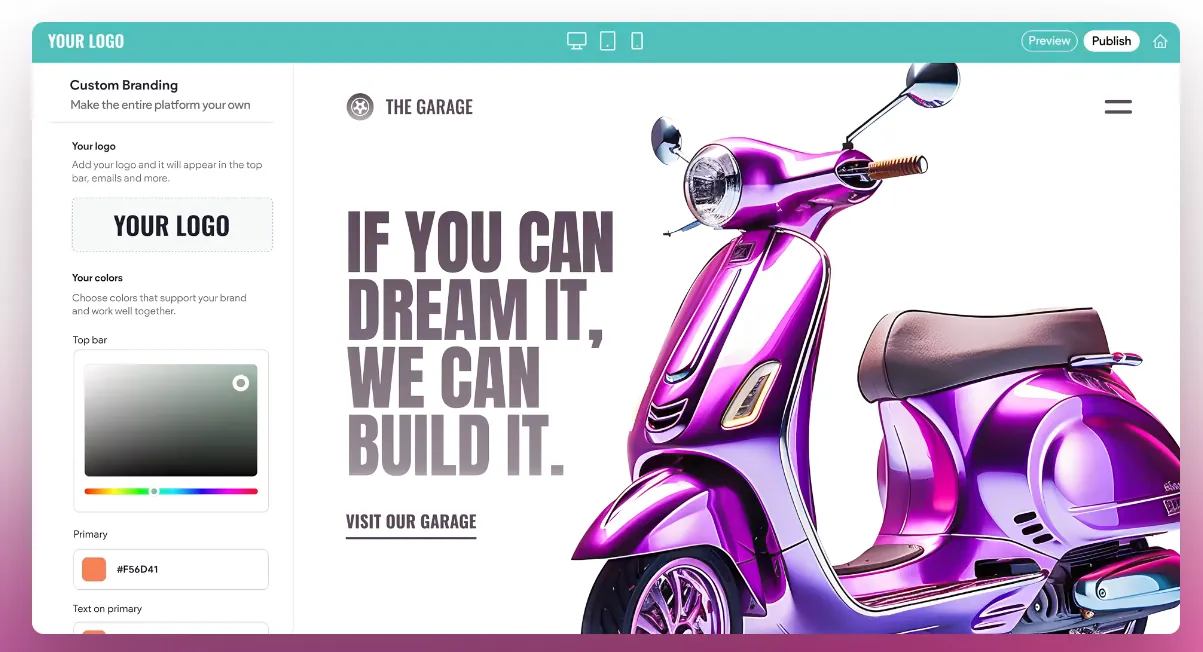
Key Features
- Client management tools – White-label portals, permissions, and team access
- Drag-and-drop editor – Fast, visual site design with mobile responsiveness
- Site personalization – Show different content based on user behavior or location
- Multi-site dashboard – Manage multiple projects in one interface
- Prebuilt sections & templates – Quickly assemble sites with reusable content blocks
- Hosting & SSL included – Secure hosting bundled with every plan
Pros and Cons
Pros
- Built specifically for freelancers and agencies
- Great tools for managing multiple client sites
- Fast and responsive editor
- Personalization and dynamic content support
- White-label branding options
Cons
- More expensive than general-purpose builders
- Less ideal for individual site owners
- Smaller app marketplace
Who It’s For
Duda is best suited for professionals building websites for others and need efficiency, client-facing tools, and a scalable workflow. If you’re offering website building services or managing multiple brands, Duda makes it easier to stay organized and deliver high-quality results.
IONOS: Best for budget-friendly business websites
 1 month money back trial
1 month money back trial  Free domain for first year
Free domain for first year IONOS offers a low-cost website builder geared toward small business owners who want a basic, functional online presence without spending much. Its platform includes essentials like a drag-and-drop editor, business-focused templates, and email accounts. While it’s not the flashiest tool, it’s reliable and affordable, making it a contender for the best website builder for small business users on a tight budget.

Key Features
- Easy drag-and-drop builder – Clean interface with industry-specific templates
- Built-in email – Includes professional email accounts with hosting
- Mobile-friendly templates – Automatically optimized for phones and tablets
- Business tools – Contact forms, maps, scheduling widgets, and more
- Integrated hosting & SSL – Everything bundled in one package
- SEO basics – Tools for meta tags, alt text, and keyword guidance
Pros and Cons
Pros
- Very affordable starting plans
- Simple and straightforward setup
- Built-in business features
- Hosting and email included
- Reliable performance for smaller sites
Cons
- Limited design flexibility
- Fewer advanced features or integrations
- Interface feels more dated than competitors
Who It’s For
IONOS is a strong option for small businesses that need a professional website up quickly, without unnecessary extras. It’s one of the best web builders if you’re focused on cost-efficiency and just need the basics done right.
Elementor: Best for WordPress users
 Top rated drag & drop editor
Top rated drag & drop editor  Live editing capabilities
Live editing capabilities Elementor is a visual website builder plugin for WordPress that lets users design sites using a drag-and-drop interface without needing to code. It brings real-time editing, advanced styling options, and powerful widgets into the WordPress environment. For users who already work in WordPress or want more control over layout and design, Elementor is a standout among professional website builders.
Key Features
- Live drag-and-drop editor – Design pages visually with real-time updates
- Theme builder – Customize headers, footers, and global site elements
- Widgets & templates – Choose from 100+ elements and prebuilt page designs
- Responsive design tools – Adjust how your site looks on desktop, tablet, and mobile
- Pop-up builder – Create promotional banners, lead capture forms, and more
- WooCommerce support – Build and style online stores within WordPress
Pros and Cons
Pros
- High level of design flexibility
- Seamless integration with WordPress
- Large community and template library
- Great for creating unique layouts
- Extensive customization without code
Cons
- Only works with WordPress (not a standalone builder)
- Can slow down sites if not optimized properly
- Some advanced features require paid version
Who It’s For
Elementor is ideal for users who want full design control within WordPress. If you already use WordPress—or plan to—and want a visual editing experience, Elementor is one of the top website builders for building polished, fully customized sites.
BigCommerce: Best for growing and large online stores
 100+ design templates
100+ design templates  Drag & drop product merchandising
Drag & drop product merchandising BigCommerce is a scalable website builder built specifically for ecommerce. It’s designed to support growing businesses and high-volume sellers with advanced features like multi-channel selling, custom checkout, and enterprise-grade integrations. While it’s more complex than beginner-focused tools, it offers deep functionality that makes it a strong professional website builder for serious merchants.
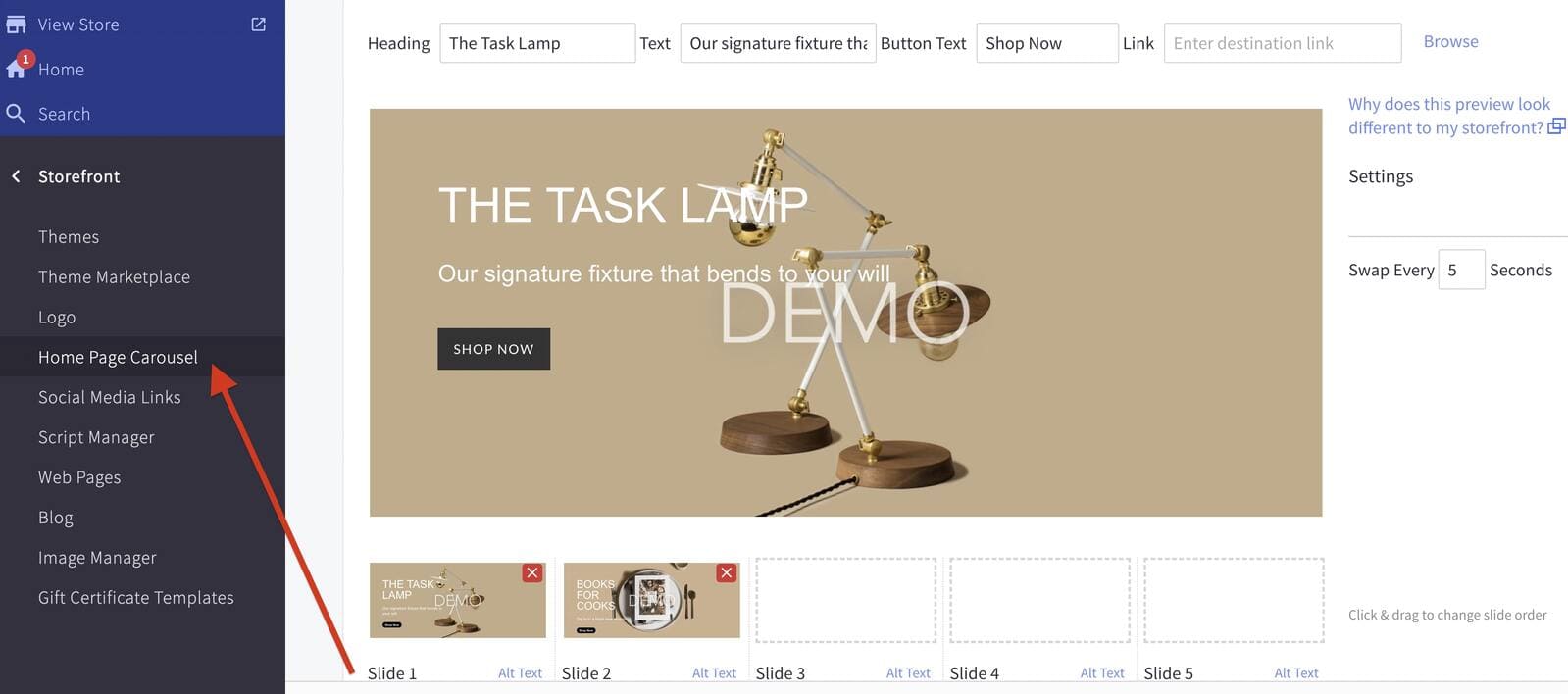
Key Features
- Multi-channel selling – Sell on Amazon, eBay, Facebook, Instagram, and TikTok
- Flexible product options – Manage variants, SKUs, inventory, and categories
- Custom checkout – Tailor the shopping experience with developer tools
- Built-in SEO tools – Clean URLs, schema markup, and advanced settings
- Ecommerce analytics – In-depth reports on sales, customers, and conversions
- No transaction fees – Keep more of what you sell
Pros and Cons
Pros
- Powerful ecommerce infrastructure
- Scales well with business growth
- Supports complex product catalogs
- Great SEO and marketing capabilities
- Built-in multi-channel sales tools
Cons
- Steeper learning curve than entry-level builders
- Overkill for small or single-product stores
- Pricing tiers can get expensive as you grow
Who It’s For
BigCommerce is best for online retailers who are scaling, or plan to. If your store needs advanced inventory control, multi-channel selling, and customizable checkout experiences, this is one of the best website makers built specifically for ecommerce growth.
SITE123: Best for simple one-page or small sites
 24/7 live chat support
24/7 live chat support  Sell globally with an online store
Sell globally with an online store SITE123 is a no-frills website builder built for speed and simplicity. It’s ideal for users who need a clean, functional site with minimal effort for one-pagers, personal portfolios, or small service-based businesses. With guided setup, basic design tools, and essential features baked in, it’s one of the best easy website builders for users who want to get online fast.
Key Features
- Step-by-step setup wizard – Answer a few questions and the platform builds your layout
- Prebuilt templates – Choose from structured designs optimized for different industries
- Mobile responsiveness – All templates adjust automatically for mobile
- Form and contact tools – Built-in modules for bookings, contact, and feedback
- Free plan available – Basic features included at no cost
- Multilingual support – Easily create sites in multiple languages
Pros and Cons
Pros
- Extremely fast and easy to use
- Great for beginners with no tech experience
- Free plan available
- Multilingual features included
- Requires very little customization
Cons
- Limited design flexibility
- Not ideal for complex or growing businesses
- Fewer integrations and features compared to others
Who It’s For
SITE123 is best for individuals, freelancers, or small service businesses that need a simple web presence without the learning curve. If you want to build a website in under an hour and don’t need many extras, this tool delivers just that.
Webador: Best for first-time users
 Used by 123,000 small business owners
Used by 123,000 small business owners  No coding or design experience required
No coding or design experience required Webador is a user-friendly website builder designed for simplicity and speed. It’s well-suited for personal projects, small portfolios, and anyone creating their first website. With free hosting, a built-in editor, and ready-to-use templates, Webador focuses on getting you online fast—making it one of the most accessible free website builders available.
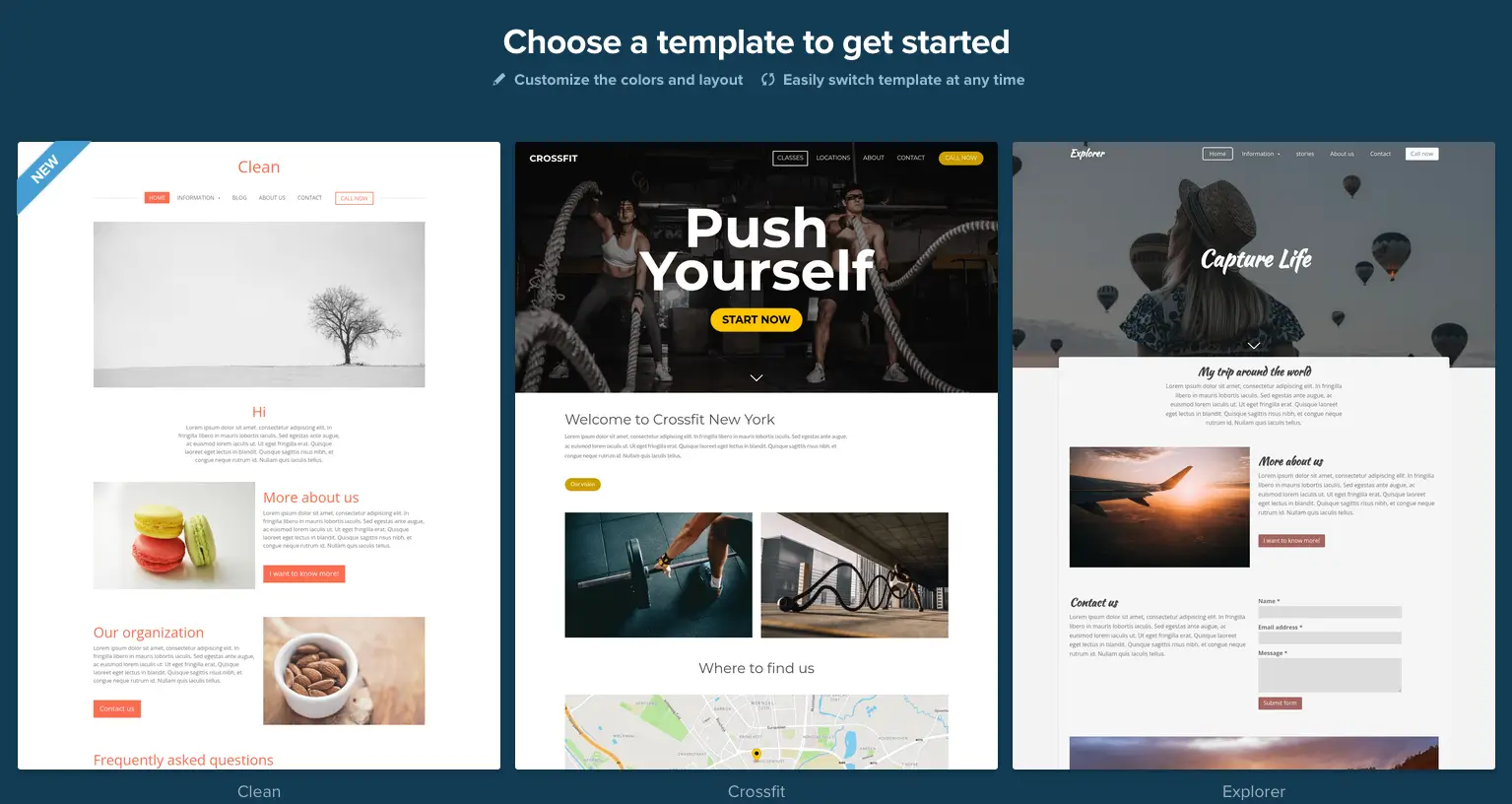
Key Features
- Beginner-friendly editor – Simple drag-and-drop tools with minimal learning curve
- Responsive templates – Mobile-ready themes that require no extra setup
- Free domain & hosting – Included even on the free plan
- Blog and form features – Add basic functionality like contact forms and blog posts
- Photo galleries and video – Showcase media easily with built-in blocks
- Fast publishing – Launch your site within minutes of signing up
Pros and Cons
Pros
- Very easy to use, even for total beginners
- Free plan includes hosting and domain
- Clean templates for basic websites
- No coding or technical setup needed
- Good for personal and hobby sites
Cons
- Not designed for business or ecommerce
- Limited scalability and customization
- Lacks advanced marketing and SEO tools
Who It’s For
Webador is best for users who want a simple, no-fuss way to publish a website for personal use, hobbies, or portfolios. If you’re looking for the best website maker that doesn’t require a steep learning curve, it’s a strong pick for getting started for free.
What is a website builder?
A website builder is a tool that lets you create a website without needing to write code or hire a developer. It’s designed to simplify the process of going online—whether you’re launching a small business, personal blog, or online store. Most top website builders offer an all-in-one experience that includes design tools, hosting, templates, and often even ecommerce and marketing features.
Here’s what a website builder typically includes:
- Drag-and-drop editor – Visually design your site by moving elements like images, text, and buttons
- Pre-designed templates – Start with professionally designed layouts for business, personal, or ecommerce use
- Built-in hosting – No need to set up separate web hosting—it’s usually included
- Responsive design – Templates that automatically adjust to mobile and tablet screens
- Domain connection – Use a custom domain (e.g. yourbusiness.com) or a free subdomain
- Add-on tools – Extras like contact forms, appointment booking, blog tools, and pop-ups
- SEO features – Basic tools to help your site appear in search engines
- Ecommerce functionality – (On select builders) Sell products, manage inventory, and process payments
- AI-powered tools – Some best website makers now offer AI site generation, content writing, and more
Website builders are popular because they offer a fast, budget-friendly way to build a website—especially for users who don’t have technical experience.
How to choose the best website builder for your needs
With so many website builders on the market, it can be tricky to know where to start. Some platforms are built for selling products, others for blogging, and some for launching a personal portfolio in minutes. Here’s what to consider:
1. Start with a clear goal
Before signing up for any website building service, ask yourself: what do I actually need this site to do?
Are you building an online store? Showcasing photography? Running a blog or offering booking services? Knowing your end goal helps you narrow your options—some builders are packed with ecommerce tools, while others shine in design and content flexibility. Think about your priorities: visuals, speed, SEO, or sales.
2. Consider value, not just price
Cost matters, especially if you’re a startup or small business. But the cheapest plan isn’t always the smartest investment.
When comparing pricing tiers, don’t just count features—look at what those features actually do for you. A higher-priced plan with built-in marketing tools or AI features might save you time and boost performance, while a bloated plan with extras you’ll never touch could just eat into your budget.
3. Usability is key
The best tool is the one you’ll actually use. Choose a website maker that matches your comfort level. Do you prefer working from a desktop or your phone? Want a drag-and-drop builder or a form-style wizard?
Also, pay attention to how the mobile version of your site is managed—some builders lock mobile edits to the desktop layout, which can be limiting if your audience browses on their phones.
4. Plan for the long run
Even if you’re starting small, your website may grow. Will your platform grow with you?
Scalability matters. Some of the top website builders offer features like ecommerce upgrades, email marketing, and CRM integrations—great for when your business expands. Others may hit limits as your needs evolve, requiring a costly migration down the line. It’s better to plan ahead than start over.
5. Try before you commit
One advantage of today’s platforms is that many offer free trials or freemium versions. Test a few to see which one clicks with you—literally. If a free website builder feels clunky or restrictive, that’s a red flag. Use trials to test templates, drag-and-drop editors, support options, and ease of publishing.
What to expect from your website builder
Choosing the best website builder means knowing what’s typically included—and what might require a paid upgrade or add-on. While every platform is different, most website building services cover the basics and give you room to grow.
Here’s what you can generally expect from a modern website builder:
- User-friendly interface – Most platforms are built for non-tech users with intuitive, drag-and-drop editors
- Customizable templates – Dozens (or hundreds) of ready-made layouts for different industries and purposes
- Responsive design – Mobile optimization is usually built in, so your site looks great on any screen
- Free domain (temporarily) – Some plans include a free domain for the first year or a free subdomain (e.g. yourname.builder.com)
- Hosting and SSL security – No separate hosting needed; your site is hosted and protected with SSL encryption
- Basic SEO tools – Page titles, meta descriptions, image alt tags, and URL customization are usually included
- Blog and media support – Most builders let you add image galleries, blog posts, and video content
- Ecommerce (on select plans) – If you choose a builder like Shopify or Wix, expect product listings, payments, and order tracking
- Support options – Access to help via live chat, email, or help centers with tutorials and FAQs
- Upgrade paths – As your needs grow, you can usually unlock more features by moving to a higher-tier plan
Some platforms also go beyond the basics and offer:
- AI-powered features – Tools to generate content, suggest layouts, or build your site from a short questionnaire
- Marketing tools – Email campaigns, pop-ups, and lead capture forms
- Integrations – Apps or plugins that connect your website to tools like Google Analytics, Shopify, Mailchimp, or social media platforms
Ultimately, your website builder should help you launch fast, look professional, and be easy to maintain—even if you’ve never built a website before.
The Bottom Line
The best website builders are simple, fast, and cost-effective. You don’t need to code or hire a developer. Most platforms offer built-in templates, hosting, and tools to help you launch and grow with minimal effort.
Start by defining your goals, then choose a builder that fits your budget and priorities. For online stores, Shopify or BigCommerce make sense. For design control, go with Wix or Squarespace. If you’re just getting started, try a free plan with SITE123 or Webador.
Test a few options, compare features, and build a site that actually does what you need.
FAQ
Q:What is the best website builder?
A: There’s no single “best” option for everyone. Wix is great for creative freedom, Shopify is built for ecommerce, and Squarespace is ideal for design-focused sites. The best website builder depends on your goals, budget, and experience level.
Q: Can I build a website for free?
A: Yes, some platforms offer a free website builder plan. Options like SITE123, Webador, and Wix let you start without paying, though features and customization will be limited. For full functionality, most users upgrade to a paid plan.
Q: Are website builders good for small businesses?
A: Definitely. Many of the best website builders for small business include tools like online booking, SEO, ecommerce, and built-in marketing. They’re a great way to create a professional site without hiring a developer.
Q: Do I need hosting if I use a website builder?
A: No. Most website building services include hosting as part of the plan. You won’t need to set up anything separately—your website is hosted automatically once you publish.
Q: Can I sell products using a website builder?
A: Yes, if you choose a builder that supports ecommerce. Shopify, Wix, Squarespace, BigCommerce, and Hostinger are all strong options for selling online. Look for features like product pages, payments, inventory, and shipping tools.
Q: Will my website be mobile-friendly?
A: Almost all modern website builders use responsive templates that work on phones and tablets. Some platforms let you edit the mobile layout separately, while others sync it with your desktop design.
Q: Is it hard to switch website builders later?
A: Yes, switching builders usually requires starting from scratch. Most platforms don’t allow direct transfers between systems, so it’s best to choose a builder that can scale with your needs from the beginning.

